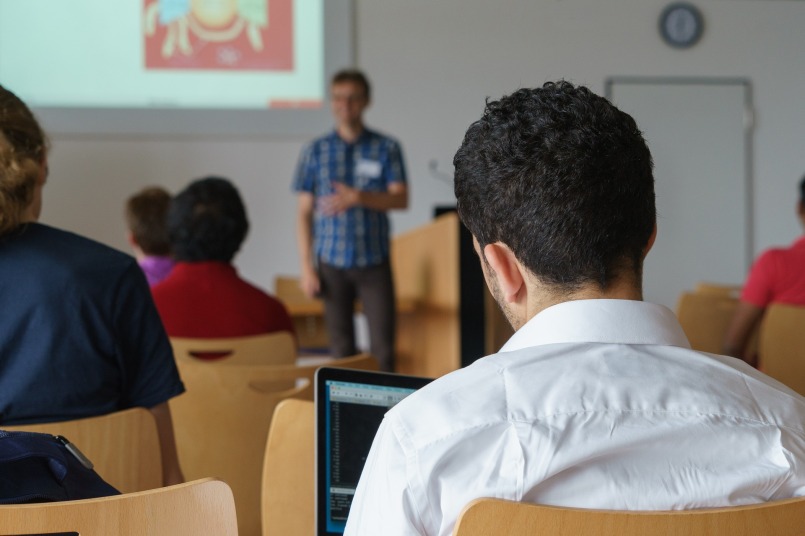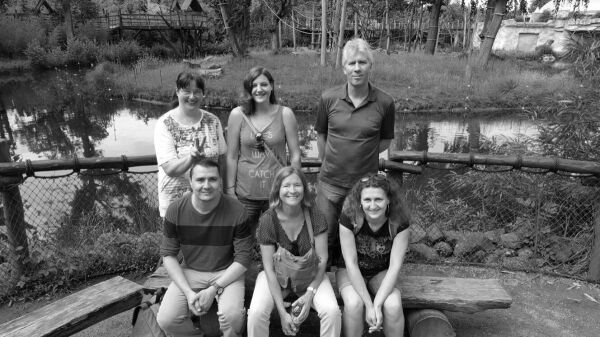M.Sc. Electrical Engineering and Information Technology (Distance Study)
Study period
6 semesters (3 years) as part time study course
Credits
120
Study begin
Winter and summer semester
Study place
University distance learning program
Language
German
Description
At the University of Duisburg-Essen, engineers with a bachelor's degree or university of applied sciences degree will have the opportunity to qualify for a scientific doctoral career or as employees in management positions in the electrical engineering and information technology industry - in the "University Master Distance Learning Program in Electrical Engineering and Information Technology."
The distance learning program is a unique career opportunity to further your education while working and at the same time pursue a master's degree. This actively counteracts the impending shortage of skilled workers in the electrical engineering and information technology industry and expands your skills and scientific qualifications.
The 4 selectable profiles allow you to look in different directions.
While the focus of automation engineering is on theoretical and experimental modeling and simulation, advanced methods and theories of control engineering, treatment of stochastically disturbed systems, technologies of devices and systems in automation engineering and applications in electrical power engineering, the profile in digital communication systems focuses on optical networks, analog and digital system theory, statistical signal processing, coding theory, transmission technology (especially for radio systems) and radio wave propagation as well as antennas.
For the development of new communication systems or for the optimal use (dimensioning and parameterization) of given systems, an in-depth understanding of the basic transmission methods is of crucial importance, while in automation technology the quality and safety with simultaneous cost reduction, both in increasing requirements for energy efficiency in production and in products is used.
The ever-increasing speed demands on circuit electronics, particularly in the context of message-based data transmission, means that both the electronic components and the resulting transmission channels must often be operated at the limits of what is physically possible. Against this background, the profile in high-frequency systems provides an insight into the theory and modeling of electronic fields, wave propagation in radio channels and optical transmission media, systems and components of optical communication, antenna technology and high-frequency systems, and thus also circuit concepts of microwave electronics.
In the context of the energy transition, it will be essential to flexibly adapt networks and consumption to the fluctuating regenerative feed-in. For this reason, the profile Intelligent Energy Networks focuses on electromagnetic fields and high-voltage technology, generation and transport of electrical energy, decentralized electricity generation and distribution, (intelligent) control and regulation of energy networks.
Study at UDEStudy plan
Study plan
Study plan
You can find the examination regulations for your study program here: Examination regulations according to study programs
Study plans as well as information about the modules in the study program can be found here.
Information material
Prospective students will find an overview of the study program here, possibility for a study taster as well as some frequently asked questions.
Current information on exams and other relevant topics can be found here.
Further information on the Master program can be found at: Masterprogram EIT.
Study plans as well as information about the modules in the study program can be found here.
Admission
Admission requirements
- Degree in electrical engineering from a university with at least 6 semesters of standard study time, e.g. Bachelor or Dipl.-Ing. (FH) or Dipl.-Ing. (BA),
- Overall grade 2.5 or better (the examination board decides on exceptions).
- No admission restriction (NC), provided that the requirements are met.
Info: Students who have completed their degree in a program with less than 7 semesters of standard study duration (210 credits) must complete additional supplementary subjects, in the case of 6 semesters of standard study duration (180 credits) usually in the amount of 30 credits. Requirements may also be imposed in the case of a lack of subject-specific fundamentals.
Admission
Unrestricted admission for students who meet the requierements (study places are not limited).
Eligibility assessment procedure
Procedure for enrollment
1. application for verification of prior professional education
Interested students submit an informal application for verification of their prior academic qualifications, together with the required supporting documents, to the Examination Committee, by mail or e-mail to the following address:
University of Duisburg-Essen
Faculty of Engineering / Dept. EIT
Examination Board for the Online Master EIT
Bismarckstr. 81
47057 Duisburg
E-mail: online-master-eit@uni-due.de
Required documents (for the time being, uncertified copies or scans of the originals are sufficient):
Short curriculum vitae in table form containing at least the following information:
- Full name,
- date and place of birth,
- postal address and e-mail address,
- highest school degree obtained,
- all previous courses of study (completed and not completed),
- previous or current professional activities as an engineer, if applicable.
Final certificate of the electrotechnical studies qualifying for the Master (Bachelor, Diplom FH, BA). If this does not show the grades and credits of all individual subject examinations, appropriate documents must be enclosed (e.g. transcript of grades). In addition, the standard duration of studies and, if applicable, the number of included practical semesters must be indicated.
In the case of other (completed and not completed) engineering courses of study: Official grade transcripts with grades of all passing and failing exams.
Desired field of specialization
2. decision of the examination board
The responsible examination board decides on the application. If necessary, the examination board may request further information about the previous periods of study and their subject content. In any case, a notification of the decision and, if applicable, of the conditions imposed (i.e. additional examination subjects) will be issued.
3. application for enrollment
After a positive decision by the examination board, you can enroll within the applicable deadlines. You can enroll either in person at the enrollment area of the Duisburg campus or by mail to the following address:
University of Duisburg-Essen
Enrollment and Examination Office
Enrollment Area, Duisburg Campus
Geibelstr. 41
47057 Duisburg
Please enclose:
- The completed form "Antrag auf Einschreibung" (Application for Enrollment). This application also contains all important information such as enrollment deadlines, required documents, etc.
- Certificate from the examination board confirming that you meet the admission requirements and any conditions or credits (also known as a "certificate of equivalence").
- Certified copy or certified photocopy of the school leaving certificate (high school diploma or certificate of the FH maturity).
- Certified copy or certified photocopy of the final certificate of the previous study program qualifying for the Master's program.
- If you have already failed examinations or acquired malus points at a German university, an official transcript of grades (including negative examination results) must be submitted.
- Exmatriculation certificate if you were enrolled at another university in Germany. This certificate must show the period of enrollment. The certificate is also required if you have already completed a course of study and/or the exmatriculation took place a long time ago.
- Proof of health insurance in accordance with the legal regulations on student health insurance: Please contact your health insurance company in any case regarding the submission of the relevant certificate. For privately insured students, the AOK (if you have never been insured with a statutory health insurance company) or the statutory health insurance company with which you were last insured will issue a certificate stating that you are exempt from the statutory insurance obligation. We do not require a certificate from your private health insurance company, only the exemption certificate from the statutory health insurance company. The insurance card cannot be accepted either! (Not applicable for secondary students).
- Certified copy of identity card or passport (foreign applicants need their passport in any case).
- passport photo (please paste into the corresponding field on the first page)
- a self-addressed small envelope for sending the student ID card
Additionally in certain special cases:
- If you have already been enrolled in an electrical engineering master's program at another university: Certificate of study of the last semester.
- If you have not acquired your study qualification at a German-speaking institution: Proof of a DSH language exam.
- If you are studying at another university at the same time and wish to enroll at the UDE as a second student: Certificate of enrollment indicating the course of study at the first university.
4. confirmation of enrollment
The university's enrollment section completes the enrollment and informs about the data for the payment of the semester fee, which then has to be transferred.
At the same time, the new students receive a university user ID that allows them to access the Internet and the university's electronic services. They can then activate the user ID via the web portal, which also automatically sets up two personal university e-mail addresses.
5. registration for the online courses
After enrolling in the first semester or re-registering in higher semesters, students register for the online courses they wish to take. Registration and payment are required to access online courses.
At www.online-master-eit.de, among other things, the "Course Shop" can be accessed. After logging in with your university ID, you can register for the online courses you wish to take in the current semester. Immediately, feedback is given about the amount to be paid and the payment modalities. After receipt of the payment, access to the courses is activated via the Moodle learning system.
Special enrollment requirements
The general enrollment deadlines of the University of Duisburg-Essen apply.
Language Skills
The language of instruction at the University of Duisburg-Essen is German (except in the English-language programs). Therefore, you must have good German language skills if you want to study successfully. The majority of foreign applicants must pass the "Deutsche Sprachprüfung für den Hochschulzugang" (DSH 2 level; with some exceptions) before beginning their studies.
- German nationals (persons who have acquired their higher education entrance qualification in Germany or at a German school abroad) do not require any special proof of German language skills.
- Citizens of an EU member state (and citizens of Iceland, Liechtenstein, Norway) or German citizens with a foreign educational qualification, as well as
- Citizens of a country outside the EU with a foreign university entrance qualification must pass the "Deutsche Sprachprüfung für den Hochschulzugang" (DSH 2 level) or the TestDaF (TDN 4) before the begin of their studies.
Information on the German Language Test for University Entrance (DSH)
Additional language skills
In the international environment of electrical engineering and information technology, English plays an increasing role as an international technical language. The aim of the program is therefore also to impart a familiarity with the English technical language through the use of the English language in selected courses. Appropriate language skills are therefore expected.
Costs and Fees
The costs are determined according to the number of credits, i.e. you pay 12 euros per credit for the master courses. There is an additional social and student body contribution of currently approx. 320 euros per semester.
If you complete your studies within the standard period of study, you will incur the following costs:
720 euros for all courses (60 CP)
360 euros for supplementary subjects, if they have to be taken (30 CP)
47,50 Euro per semester for the student union (50% reduced price for distance learning students, currently in negotiation with the student union)
13 Euro per semester for the AStA
196,62 Euro per semester as mobility fee (VRR-Ticket and NRW-Ticket)
In the standard period of study of 6 semesters (not including required subjects), less than 2,500 euros must be paid for the complete course of study.
General Information
Living & Studying at the University of Duisburg-Essen

Semester
The academic year is divided into semesters.
- Winter semester: from October to March
- Summer semester: from April to September

Lecture period
The winter lecture period usually starts in mid-October and ends in mid-February. In summer, the lecture period usually starts in mid-April and ends in July. During the winter semester there is a break of about two weeks during the Christmas holidays.

Examination phase
The examination phase begins about one week after the end of the lecture period and lasts about seven weeks.
Semester fee
All students have to pay a semester fee (social contribution) of about 320,- Euro per semester. You can find the current amount here. The social contribution includes, among other things, a semester ticket for public transportation in North Rhine-Westphalia and discounts on meals in the university's canteen and cafeteria.
Living expenses
We recommend to consider approximately 800 to 1000 Euro of personal expenses per month.
Accommodation
Accommodation is possible in dormitories of the Studierendenwerk and in premises of the free housing market. The rent in a room in a student dormitory is about 300,- Euro per month. You can find more information about housing options here.
Introduction of the institutes
Contact
You have questions? We have answers!

Support Center for (International) Engineering Students Student advisory service
SG 119
Geibelstr. 41
47057 Duisburg
Tel.: +49 (0)203 379 3776
E-mail: scies@uni-due.de

Student council Electrical Engineering and Information Technology
We are your point of contact! If you have questions about your studies or general concerns about us or our lecturers, you can contact us. We will solve your problems and answer your questions directly if possible or forward you to the right people. Just write us an email (fsr-et@uni-due.de), or on Facebook or Instagram!
For prospective students and enrolled students General student counseling
ABZ offers counseling to prospective students, enrolled students and graduates on all questions concerning the choice of study program, studies and the transition into working career.
Support in the Faculty
Dr.-Ing. Rüdiger Buß
Phone: 0203 379-1180
Board of examiners
Chairman
Prof. Holger Hirsch
Vice chairman
Prof. Andreas Czylwik














